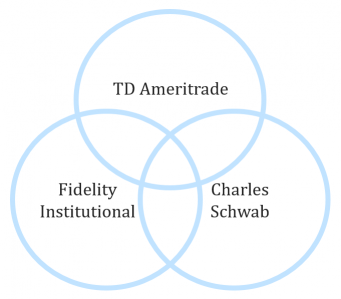FPL Capital Management has established strategic relationships with industry leaders in order to provide our clients with the most comprehensive investment management services available. All of our relationships are very important to us as they play a very integral part of our process of serving our clients.
FPL Capital Management has established strategic relationships with industry leaders in order to provide our clients with the most comprehensive investment management services available. All of our relationships are very important to us as they play a very integral part of our process of serving our clients.

Access the institutional investment platforms of Charles Schwab & Co., Fidelity Institutional and TD Ameritrade offering more than 1,000 investment vehicles and strategies to customize your portfolio.
Offerings include:
- Institutional fund families such as PIMCO, AQR, Stone Ridge and Dimensional Funds (DFA)
- Third-Party Money Managers and Strategists
- Private Equity Investments at institutional pricing from companies, such as iCapital Network, Blackstone and KKR
Typically, mutual fund companies offer multiple types of shares. Some companies offer no-load funds and others offer load funds. Load fund companies offer retail shares with different load structures, such as “A”, “B”, and “C” being the most common ones. Type “A” is a front-load fee – the investor gets charged a fee before actually being invested in the fund. Type “B” is a deferred-load fee – the investor gets charged at the end of a term. Type “C” is a constant-load fee – the investor gets charged a sales fee throughout the holding period of the fund.
Then, there are no-load shares which are slowly becoming the norm in the mutual fund industry. They carry no 12b-1 fees either. No-load shares typically have retail and institutional share types. Some companies have more than one depending on the amount of money you have available to invest. For example, Vanguard has five different share types (investor, admiral, signal, institutional, institutional plus). Each has a different purchase minimum and an expense ratio. Normally funds with higher minimums have lower expense ratios.
All of these minimums apply to retail investors. If you are under the advisory of a registered investment advisor, all of the minimums are typically waived. However, the expense ratio is still enforced. Normally, expense ratios for institutional shares range somewhere between 5 and 100 basis points. That is much lower compared to retail shares which charge investors 25 to 250 basis points.
| Fund Name | Ticker | Expense Ratio | 2016 Performance |
|---|---|---|---|
| PIMCO Total Return Institutional Fund | PTTRX | 0.46% | 2.60% |
| PIMCO Total Return Retail Fund | PTRRX | 1.10% | 1.95% |
| Harbor International Institutional Fund | HAINX | 0.77% | 0.25% |
| Harbor International Admin Fund | HRINX | 1.02% | -0.01% |
| Voya Index Plus Large Cap Institutional Fund | IPLIX | 0.44% | 10.27% |
| Voya Index Plus Large Cap Class A Fund | IPLSX | 0.69% | 10.00% |
The Unified Managed Account (UMA) is an innovative investment solution that allows multiple unaffiliated products to be held in a single account with automated services, such as rebalancing and customization.
- UMA programs combine the benefits of both SMAs and mutual fund wrap programs.
- Affordable alternative to high minimum for SMAs, as UMA minimums start as low as $25,000
Under our UMA platform, clients can access tactical money managers such as:
- Newfound Research
- Churchill
- Miller Howard
- Model Capital
- Julex
- Stonebridge
- Fisher Investments
Ideal for clients who need specialization and prefer separate accounts for each investment strategy
Benefits
- Expert Management
- Tax Management
- Specialized Services
- Competitive Pricing
When one’s assets are being managed by an advisor, most clients are concerned with where the assets are held. Most investors believe that the assets are actually held at the advisory firm, which is completely untrue. Client assets are held at reputable brokerage firms. Clients may open accounts at the brokerage firm of their choice, such as Charles Schwab & Co., Inc., TD Ameritrade, or Fidelity Institutional Wealth Services. All three brokerage firms are insured by the SIPC (Securities Investors Protection Corporation).
Charles Schwab & Co., Inc.
Charles Schwab & Co, Inc. (“Schwab”) has more than 20 years of experience serving independent advisors. Schwab was a pioneer in the business of exclusively serving independent investment advisors and their clients.Schwab Asset Protection Factsheet
TD Ameritrade
A financial services company that has a proud history and committed to working toward a secure foundation for the future of its clients. Over the past 35 years, they have built this business on a commitment to providing you with a secure investing experience. They offer an “Asset Protection Guarantee” which states that ” If you lose cash or securities from your account due to unauthorized activity, TD Ameritrade will reimburse you for the cash or shares of securities you lost. TD Ameritrade is promising you this protection, which adds to the provisions that already govern your account, in case unauthorized activity ever occurs and we determine it was through no fault of your own.” TD Ameritrade Account Protection Factsheet
Fidelity Institutional Wealth Services
Is a leading provider of trading, custody, and brokerage services to Registered Investment Advisors, Trust Institutions, and Third-Party Administrators. The company is able to leverage the capital, resources, and expertise of the Fidelity organization, one of the world’s largest financial services companies, on behalf of its clients.
Securities in accounts carried by National Financial Services LLC (“NFS”), a Fidelity Investments company, are protected in accordance with the Securities Investor Protection Corporation (“SIPC”) up to $500,000. For claims filed on or after July 22, 2010, the $500,000 total amount of SIPC protection is inclusive of up to $250,000 protection for claims for cash, subject to periodic adjustments for inflation in accordance with terms of the SIPC statue and approval by SIPC’s Board of Directors. NFS also has arranged for coverage above these limits. Neither coverage protects against a decline in the market value of securities, nor does either coverage extend to certain securities that are considered ineligible for coverage. For more details on SIPC, or to request a SIPC brochure, visit www.SIPC.org or call 202.371.8300.
